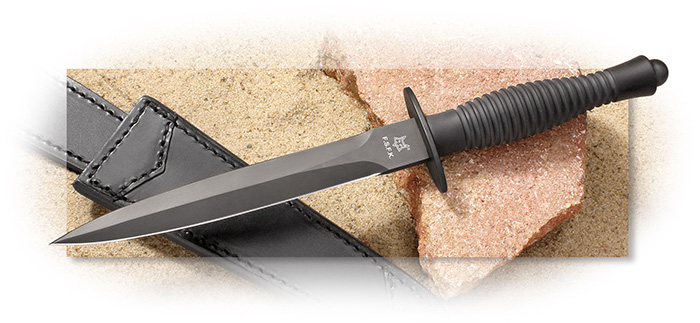Fox Sykes-Fairbairn Black Aluminum
Item #: FO-FX592
$225.00
Honoring Special Forces of the World
Fox Knives, one of the top knife manufacturers in Maniago, Italy, has created their own modern version of the Sykes-Fairbairn WWII Commando knife. It was built as a collector's knife to honor the special forces of the world. They have used a modern stainless steel and a better choice of materials for the handle, guard and sheath than was used in the 1930s-40s. The 6-7⁄8" narrow double ground blade is Austrian N690Co at 58-60 Rc. This steel is a much tougher and harder steel than the 1095 used in the original, and it is stainless. The quality of the elastic holding the butt of the knife to the sheath is so much better that my 84 year old fingers find it very difficult. Younger fingers here in our office are not finding it too strong at all. The sheath is so much better than those made in WWII, and the fit to the knife so much tighter, that I expect the elastic will matter only to those who plan to carry this tool upside down. The handle is made of black coated aluminum. Measures 11-3/4" from the tip of blade to the end of the pommel. Ships with a black leather sheath. The knife weighs 7.7 oz. In the sheath 11.0 oz. Made in Maniago, Italy.
-
TypeFixed
-
BladeDagger
-
Blade Length6-7/8"
-
Blade SteelN690Co
-
Rockwell58-60
-
Hilt GuardBlack Vapor deposition
-
HandleAluminum
-
Overall Length11-3/4"
-
Weight7.7 oz.
-
SheathLeather
-
OriginItaly
Fox Knives
FOX Coltellerie (FOX Cutlery) has been, and remains, an important part of the knife industry in Maniago. Still family owned, the company was established in 1977 by Oreste Frati. A highly qualified staff, CNC equipment of the latest generation a strong use of the newest quality knives possible. Fox knives demonstrate that a particular attention continues to be placed on creativity and design. The knife industry in Europe, as well as Japan, has always centered around one area in each country. In England, it was Sheffield; in Germany, Solingen; in Japan, Seki City; and in Italy it has been Maniago. In the recent past, we have seen a decline in quality knife production in England, Germany, the United States and most recently in Japan. In Sheffield, the industry has been gone for a long time. There are good companies making quality knives remaining in Germany, Japan and the U.S., but they are few. Many have succumbed to the pressure to make cheaper knives which has resulted in the move of a tremendous amount of knife production first to Taiwan and then to China. It is only Maniago, the art of metal working and knifemaking has been in practice since Medieval times.

